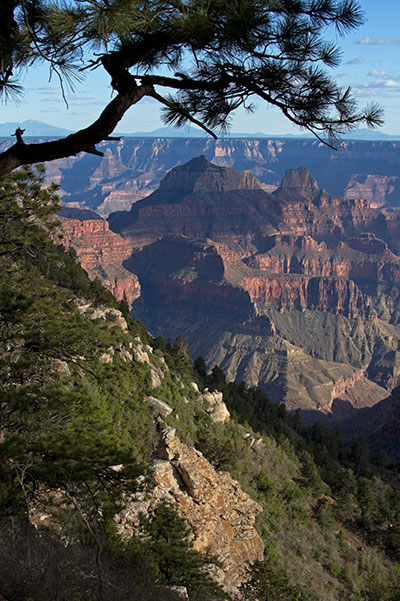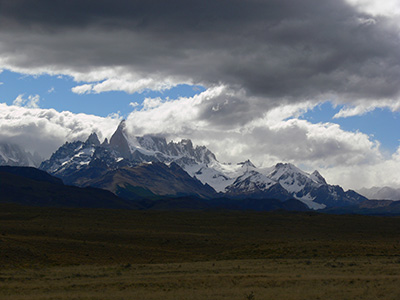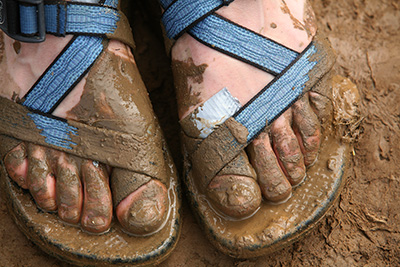
By Candice Gaukel Andrews
 What makes a tourist different from a traveler? When recently pondering that question, I found Merriam-Webster's to be of little help. My old standby dictionary defines a tourist as "one that makes a tour for pleasure or culture" and a traveler as "one that goes on a trip or journey." No big distinction there.
What makes a tourist different from a traveler? When recently pondering that question, I found Merriam-Webster's to be of little help. My old standby dictionary defines a tourist as "one that makes a tour for pleasure or culture" and a traveler as "one that goes on a trip or journey." No big distinction there.
I then took a different tack: I checked forums on the Internet where the issue had been discussed. On the Fodor's site, a commenter identified as "nytraveler" wrote, "I'm a tourist. I go to all sorts of places independently and want to see how locals live. I go to typical restaurants and cafés -- but I want to see all the major sights (as well as some minor ones). At the end of the day, I want a comfy hotel room with AC, room service, and TV with a gazillion channels -- and a good concierge. I have a friend who is a traveler. She has been up the Amazon (in a canoe, not a river boat), has lived in a yurt in Mongolia, and stayed in a lot of small towns around the world without the amenities (places with limited electricity and hot water) that I expect."
Another responder stated, "Having a glass of wine for an hour in a non-touristy section of town makes you no more a traveler than someone who is having a glass of wine for fifteen minutes in the must-see part of town. Studying the nuances of the Water Lilies by Monet for half a day makes you no more a traveler than someone who looks at it for five minutes and wants to move on to the next museum."
"Fashionista" put her thoughts succinctly in one sentence: "A tourist is an amateur traveler, and a traveler is a professional tourist."
Since there seems to be no precise consensus on what makes a tourist different from a traveler, I decided to make up my own quiz, informed by the thoughts of some famous writers -- travelers all.
So, answer my five questions, below, to find out whether you're a confirmed, unapologetic tourist or a true traveler. And, if you think you've got a definitive way to distinguish between these two types of wayfarers, let us know in the comments section, found after the quiz.
Tourist or Traveler Quiz
1. Before you visit a new destination, do you conduct research and make a list of things to see and do, so that your time on vacation is well spent?
❏ Yes
❏ No
2. Once you return home from a trip, what's the first thing you do?
❏ Start planning for your next trip
❏ Organize your photos and post them on Facebook
❏ Spend a lot of time thinking about and remembering the trip you just took
3. When you get downtime on vacation, do you prefer to:
❏ Relax in the lounge of your hotel by reading a book or people watching
❏ Wander the nearby streets, no matter the weather conditions
❏ Take a nap in your room
4. On a guided tour, if things don't go according to the itinerary, do you:
❏ Demand a refund for that portion of the trip
❏ Feel mildly annoyed
❏ Just go with the flow
5. When deciding where to travel next, do you choose a place or culture that is:
❏ As distant as possible from where you live
❏ As different from your own lifestyle as possible
❏ It doesn't matter how distant or different
Scoring:
1. If you answered yes to this question, you're probably more of a tourist than a traveler. If you answered no, you probably have traveler tendencies.
Tourists typically have a mission in mind when they travel. For example, according to the National Geographic Society, 90 percent of all visitors to the Grand Canyon congregate at the South Rim, snap pictures, and leave within hours. I would argue that most of these people are tourists because of their singular focus on their main compulsion to just see this natural phenomenon.
According to the English journalist, novelist, and essayist Gilbert K. Chesterton, "The traveler sees what he sees, the tourist sees what he has come to see."
2. If you checked the third box under this question, it's safe to assume you're a traveler. Travelers tend to be a bit more reflective than tourists. As New York Times bestselling author Pat Conroy wrote, "Once you have traveled, the voyage never ends, but is played out over and over again in the quietest chambers. The mind can never break off from the journey." (The italics are mine.)
If you checked the first box under question 2, you're most likely a tourist (see explanation in answer 1 regarding those who are mission-oriented). If you checked the middle box, you're a little of both.
 3. A few years ago, I took a spring trip to the Southwest canyons. I have a rather active fear of heights, and after about our fifth or sixth trek on narrow paths next to sheer drop-offs in sweltering heat, our group paused for a water break. I honestly didn't know if I could physically go on. Our guide, nature photographer Eric Rock, told us, "Tourists travel through a location by seeing it from a window or a deck. Travelers allow themselves to be immersed in the spot. When you let yourself get dirty, wet, muddy, and cold, then you have found a place."
3. A few years ago, I took a spring trip to the Southwest canyons. I have a rather active fear of heights, and after about our fifth or sixth trek on narrow paths next to sheer drop-offs in sweltering heat, our group paused for a water break. I honestly didn't know if I could physically go on. Our guide, nature photographer Eric Rock, told us, "Tourists travel through a location by seeing it from a window or a deck. Travelers allow themselves to be immersed in the spot. When you let yourself get dirty, wet, muddy, and cold, then you have found a place."
If you chose "wander the nearby streets, no matter the weather conditions" for question No. 3, score one on the traveler endpoint of the continuum. If you chose "relax in the lounge of your hotel by reading a book or people watching," mark this on the tourist side. If you chose "take a nap in your room," well, it's a wash. We all get tired on trips -- especially on that sixth hike in hot sun on the brink of an abyss.
American writer Daniel J. Boorstin once penned, "The traveler was active; he went strenuously in search of people, of adventure, of experience. The tourist is passive; he expects interesting things to happen to him. He goes 'sight-seeing.'"
4. If you checked either of the first two boxes on this one, you're a tourist. Because you are mission-oriented (see answer 1), your main reason for traveling is to see the places and take part in the events you've always dreamed of seeing and doing. If this doesn't happen, it will be annoying and not what you expected to get out of the trip.
If you're a go-with-the-flow type, then you're probably a traveler, as Merriam-Webster's defines it, who's on a journey, wherever it leads.
The 1962 Nobel Prize in Literature recipient John Steinbeck said, "A journey is like marriage. The certain way to be wrong is to think you control it."
5. A good friend of mine who is an avid traveler recently sent me an e-mail. In it, she wrote news of her and her husband:
"In our current state of 'not getting around much anymore,' our wildlife viewing is mostly in our backyard, where we have a plethora of baby birds, rabbits, and squirrels. That makes it a happy hunting ground for the gorgeous male Northern harrier that often sits on the supporting pole of one of our bird feeders, about twenty-five feet from our patio. We have had harriers in our yard before, but never quite that close. We have Carolina wrens nesting in our defunct gas grill, and cardinals reposing in a hanging plant on our front porch, preventing us from watering it. We hope they fledge in time to save the plant."
This friendly message reminded me that if you're more of a traveler at heart than a tourist, your journeys have a way of continuing, even if physically, you haven't gone very far. As American icon and author Henry Miller stated, "One's destination is never a place, but a new way of seeing things." I would add that a destination could also be to another season or climate.
If you checked either Box 1 or Box 2, you're a tourist. If you checked Box 3, you're a traveler.
Whichever category most of your answers tend to fall under, there are two more questions it's worthwhile to ask yourself while traveling. These come from Rachel Carson, author of the classic book Silent Spring. She writes:
"One way to open your eyes is to ask yourself, 'What if I had never seen this before? What if I knew I would never see it again?' "
Safe and happy travels,
Candy
Photo Captions and Credits:
1. Only about 10 percent of Grand Canyon visitors go to the North Rim. ©John T. Andrews
2. Travelers and tourists should ask themselves, "What if I knew I would never see this again?" ©Candice Gaukel Andrews
3. "When you let yourself get dirty, wet, muddy, and cold, then you have found a place," says nature photographer Eric Rock. ©Eric Rock